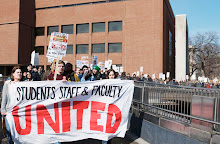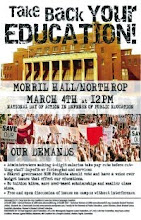FRPE focuses on higher ed issues, but this ruling on a K-12 teacher's curricular decisions is disturbing. It illustrates why academic freedom is important for all teachers. According to this ruling by the US Court of Appeals for the 6th Circuit (Cincinnati), "Only the school board has ultimate responsibility for what goes on in the classroom, legitimately giving it a say over what teachers may (or may not) teach in the classroom." The teacher, Shellye Evans-Marshall, had raised controversy among some in the community (500 parents) by teaching Siddhartha , by Herman Hesse, and a unit on book censorship. Evans-Marshal allowed students to pick books from a list of works that were targets of censorship. The outraged parents called for "decency and excellence" in the classroom, and despite positive performance reviews prior to the controversy, her contract was not renewed in 2002. Her principal accused her of a bad attitude and demeanor and loathed her "use of material that is pushing the limits of community standards." (Gee, I thought that good teachers were supposed to challenge us to think!)
The suit proceeded to discovery until the school district defendants sought summary judgment last year. A federal district court granted the defendants' motion on the grounds that Evans-Marshall could not prove a link between the community outcry and the school board's decision not to renew her.
The decisive issue in the appeals court ruling was the Supreme Court's 2006 ruling (Garcetti v. Ceballos), which held that public employees do not have 1st Amendment protection for speech "pursuant to" their official duties.
"When a teacher teaches, the school system does not regulate that speech as much as it hires that speech," Sutton wrote, borrowing language from a 7th Circuit decision in a similar case. "Expression is a teacher's stock in trade, the commodity she sells to her employer in exchange for a salary. And if it is the school board that hires that speech, it can surely regulate the content of what is or is not expressed, what is expressed in other words on its behalf."
Friday, October 22, 2010
Subscribe to:
Post Comments (Atom)


No matter the motivation, we are fortunate at the U of M to have a Regents Policy that states:
ReplyDelete"Academic freedom is the freedom to discuss all relevant matters in the classroom, to explore all avenues of scholarship, research, and creative expression, and to speak or write without institutional discipline or restraint on matters of public concern as well as on matters related to professional duties and the functioning of the University."
I have quoted this a couple of times to folks who have objected to my writings. Despite all the criticism I've had for this administration no one in Morrill Hall has ever made any attempt to shut me up....
Bill Gleason, U of M faculty and alum